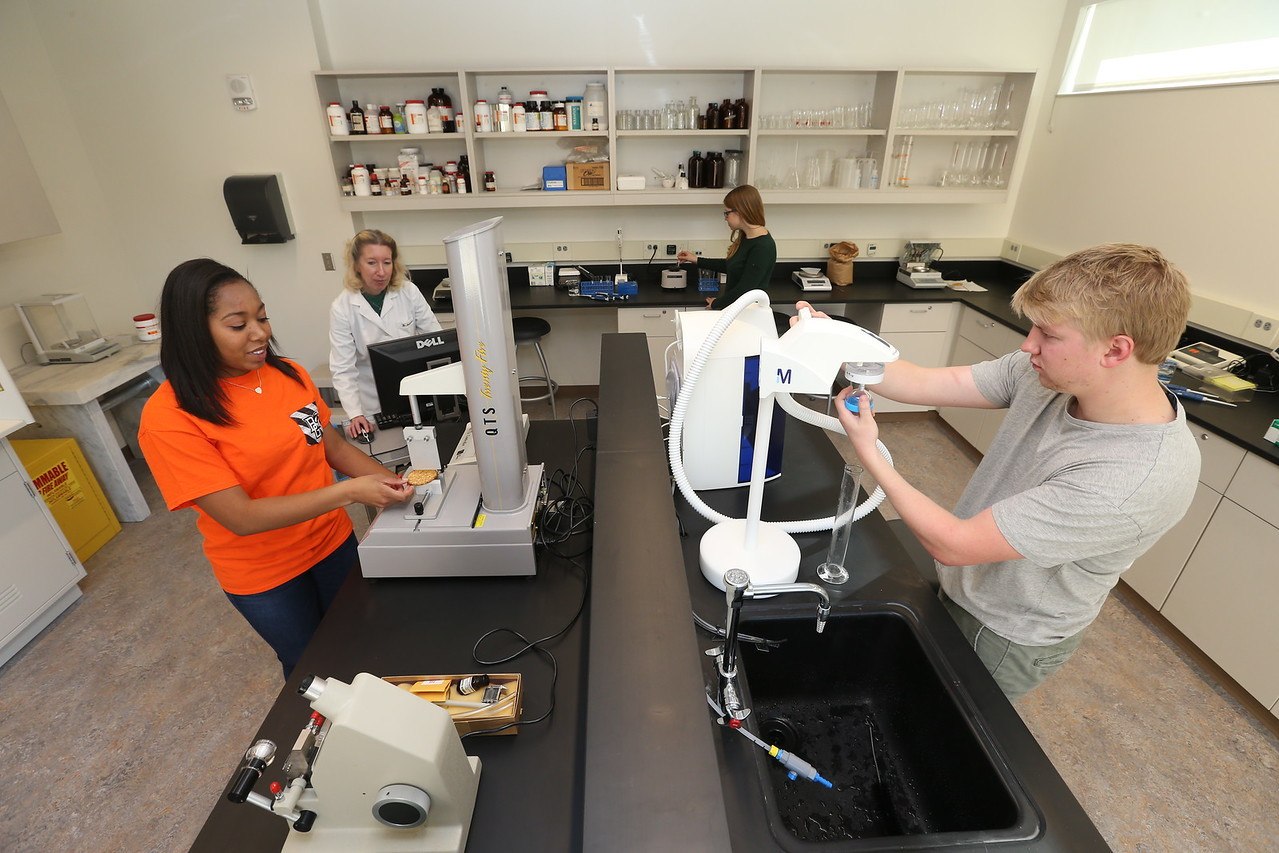Nationally recognized for student experience
The Wall Street Journal

Master of Food and Nutrition (MFN)
Food and Nutrition
Today’s entire health landscape is increasingly influenced by nutrition-related factors – from food security to obesity to chronic disease management. These are issues that are global and deeply personal.
A Master of Food and Nutrition degree from Bowling Green State University prepares you with the advanced knowledge and real-world skills to step confidently into successful food and nutrition careers in healthcare, research, public service and beyond. It’s also a good fit for currently credentialed, registered dietitians looking to level up their skills.
Tailor your degree by selecting specialized areas of interest, such as:
- Exercise physiology
- Health services administration
- Education
- Media-communication
- Business
Whether you’re aiming to become a registered dietitian, nutrition educator, researcher or nutrition researcher, you’ll graduate ready to transform lives – one bite at a time.
Program highlights
- Distinguished faculty. Our food and nutrition degree faculty brings real-world experience and cutting-edge research to the classroom. They mentor you, help you reach your goals and connect you to valuable industry contacts.
- Become a Registered Dietitian Nutritionist (RDN). BGSU offers a pathway to become an RDN.
- Flexible learning formats. Work at your own pace: full-time or part-time. Core courses are offered on campus. Electives are available online or on campus.
- Graduate assistantships. Indicate your interest in an MFN graduate assistantship when you apply for the program.
- Community connections. The BGSU Department of Public and Allied Health cultivates internal partnerships and external collaborations with clinical dietitians, food science researchers and community organizations for real-world experience, education and impact.
- Growing career opportunities. Demand for registered dietitians, nutritionists and food scientists is expected to grow 7% faster than the average for all occupations over the next decade (U.S. Bureau of Labor Statistics).
- Affordability. The streamlined curriculum of the MFN degree at BGSU helps students avoid unnecessary costs.
- Peace Corps Fellowship. Returning Peace Corps volunteers may receive financial assistance to pursue a Master of Food and Nutrition through the Paul D. Coverdell Peace Corps Fellows Program (USA).
100% of recently surveyed BGSU graduates of the MFN and dietetic internship were employed in the field of nutrition or dietetics within 12 months of graduation.
The faculty were fantastic. They were knowledgeable, up-to-date on the latest nutrition science and extremely supportive.
MFN alum
Most classes were structured enough for guidance but flexible for discussion and learning.
MFN alum
#1 public university in Ohio for career prep
The Wall Street Journal
Career opportunities
Make a living helping people live better, longer, healthier lives. The Master of Food and Nutrition program at BGSU positions you for excellent opportunities in a fast-growing field. With an advanced understanding of food and nutrition, you can help individuals, organizations and communities address significant issues, such as:
- Nutritional needs of an aging population
- Chronic disease prevention and management
- Food security and public health nutrition
- Pediatric and adolescent nutrition
- Workplace wellness and performance nutrition
- Sustainable food systems and food product development
- Culturally responsive nutrition and education counseling
- Aging population nutritional needs
The BGSU Master of Food and Nutrition graduate degree allows students to pursue a broad range of food and nutrition professions with rising demand:
- Become a clinical dietitian* or nutrition manager.
- Work as a sports dietitian* optimizing performance for athletes and active individuals. (On campus students can pursue a dual degree with the School of Human Movement, Sport and Leisure Studies – a great fit for those interested in pursuing sports nutrition.)
- Lead as a corporate wellness manager and create healthier workplace environments.
- Drive innovation as a food scientist and develop nutritious, sustainable food products.
- Teach as a nutrition educator and empower communities with life-changing insights.
*Completion of the dietetics internship is required.
Career paths
- Clinical dietitian
- Clinical nutrition manager
- Nutrition educator
- Sports dietitian
- Food scientist
- Company dietitian/Wellness manager
Quick Facts from the Bureau of Labor Statistics
Dietetics and nutrition sciences graduates have one of the lowest unemployment rates (0.4%) in the U.S. by college major.
How to become a Registered Dietitian Nutritionist
The BGSU dietetic internship program is accredited by the Accreditation Council for Education in Nutrition and Dietetics (ACEND) and provides a pathway for students to become a registered dietitian nutritionist (RDN).
To become an RDN, you must:
- Complete ACEND-accredited Didactic Program in Dietetics (DPD) coursework to earn a verification statement.
- Complete 1,000 hours of supervised practice in an accredited Dietetic Internship.
- Earn a graduate degree in nutrition or a related field.
- Pass the national credentialing exam for registered dietitian nutritionists (RDN).
If you do not have a DPD verification statement, start with didactic coursework. MFN graduate courses may meet some requirements, but not all. It's usually more efficient to complete DPD coursework first. Email the undergraduate dietetics director for a transcript review and course planning.
The first-time pass rate (2022-24 average) of the Registered Dietitian credentialing examination for on-campus and distance interns at BGSU was 90.6% – far exceeding the 80% goal.
Curriculum
The on-campus Master of Food and Nutrition degree program prepares students to address a broad range of food and nutrition needs of diverse communities across the lifespan.
The 31-credit hour curriculum provides a strong foundation in:
- Nutrition science
- Community nutrition
- Clinical nutrition
Tailor your studies to align with your professional aspirations through electives (ex: Sports Nutrition, Lifecycle Nutrition, Phytochemicals, Weight Management and special topics such as Leadership, Nutrition Communication, Food Allergies, etc.).
All students complete a culminating experience, which can be either a thesis research in food and nutrition OR one of three non-thesis options:
- Applied master’s project
- Comprehensive exam
- Dietetic internship with portfolio experience (limited to BGSU dietetic interns)
Full-time students can complete the program in 1.5 academic years.

Sample courses
- Community and Public Health Nutrition
- Micronutrients Through the Lifespan
- Research Methods in Food and Nutrition
- Macronutrients for Human Nutrition
- Advanced Clinical Nutrition
Admissions requirements
The graduate food and nutrition degree program is open to students:
- With a bachelor’s degree from an accredited college or university in dietetics, food and nutrition or a related field (e.g. public health, kinesiology, biological sciences, allied health, etc.)
- Required prerequisites coursework in biochemistry, human anatomy and physiology and human nutrition.
A GPA of 3.0 cumulative or 3.3 or higher in the last 60 credit hours is preferred, although students are ultimately selected based on the totality of factors, including:
- Academic performance
- Relevant work experience
- Letters of recommendation
- Civic and/or college activities
Graduate certificate of food and nutrition
Enhance your professional marketability with our online food and nutrition graduate certificate. The program is strategically designed for working professionals and/or graduate students in related disciplines.
The curriculum will help you gain the skills to critically evaluate food and nutrition information and apply evidence-based nutrition strategies. This graduate certificate prepares you to navigate nutrition challenges with confidence and credibility. It’s an excellent complement for those studying or already working in areas like allied health, public health or human movement and leisure studies.
The certificate is a flexible option for:
- BGSU dietetic interns who have a previous graduate degree
- Student in other master’s programs
- Anyone seeking advanced study in food and nutrition without a full degree
The graduate certificate in food and nutrition is a recognized occupation that requires a Gainful Employment disclosure.
#1 university in Ohio – big or small, public or private – students would choose again
The Wall Street Journal
The Master of Food and Nutrition program is part of the BGSU Graduate College and the Department of Public and Allied Health in the BGSU College of Health and Human Services.
Accreditation
Bowling Green State University [BGSU] is accredited by the Higher Learning Commission. BGSU has been accredited by the Higher Learning Commission since 01/01/1916. The most recent reaffirmation of accreditation was received in 2022-2023, with our next reaffirmation of accreditation scheduled for 2032-2033. Questions should be directed to the Office of Institutional Effectiveness.
Request Information
Updated: 09/05/2025 12:16PM

